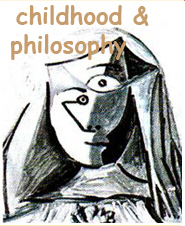who thinks better? philosophy: the fantom in the machine
Mots-clés :
philosophy of education, teaching philosophy, Philosophy for ChildrenRésumé
This article elaborates a possible articulation between philosophy, Philosophy for Children and philosophy of education through the concept of teaching. Philosophy for Children permits the discovery not only of the philosophical origins of the methodological tools used commonly in education, but their proper philosophical use. Moreover, Philosophy for Children makes evident the inner relation between philosophy itself and the phenomenon of teaching. On these grounds, and through the understanding of what constitutes philosophical education in real terms, one could adumbrate as well the role that a philosophy of education could undertake. The examples of the critical thinking movement, of the construction of inter-disciplinary thematic curricula, or of creative learning and teaching show to what extent, implicitly and in diverse ways, philosophy is central to the educational mechanism, or is needed for the function of this very mechanism. Nonetheless, at the same time, Greek educational reality marginalizes philosophy, a contradiction that could be worked out by the introduction of Philosophy for Children in the school. This very introduction requires a new kind of understanding and exercise of philosophy, but it also requires a mediator to work from the side of philosophy of education.Téléchargements
Les données relatives au téléchargement ne sont pas encore disponibles.
Téléchargements
Publiée
2012-01-03
Numéro
Rubrique
articles




